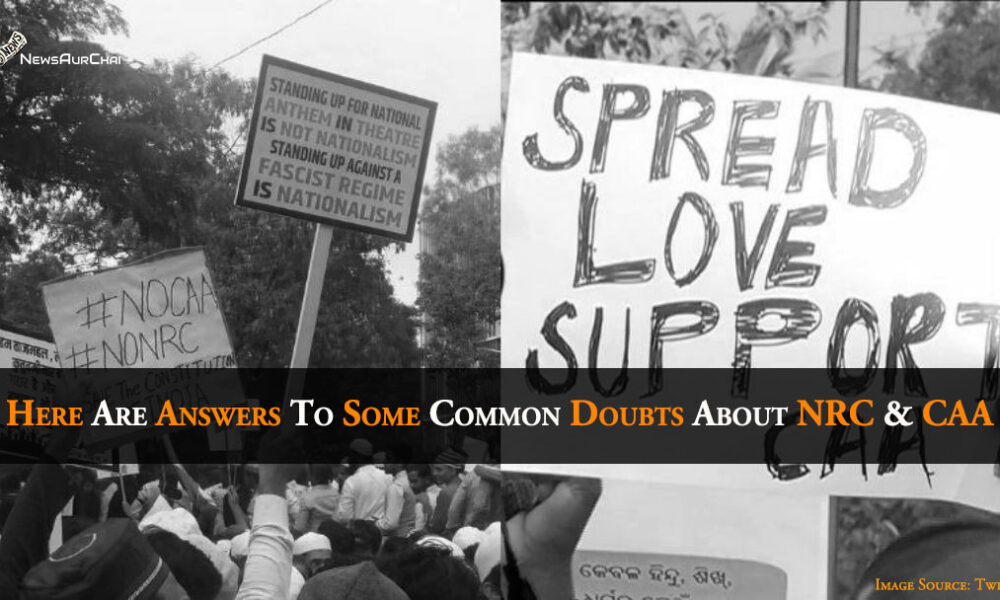Currently, people of India are on the road protesting in the name of National Register of Citizens (NRC) and Citizenship Amendment Act (CAA), while most of the people are unaware or are confused about how it will affect Indian citizens. Let me help you clear some of the confusions regarding NRC and CAA.
1. Is NRC a part of CAA?
No, both NRC and CAA are different. CAA is a separate law passed by the Parliament along with the assent of President while NRC is a separate process. National Register of Citizens rules and procedure for nationwide is yet to be decided. The NRC process, which was introduced and is ongoing in Assam, was implemented by the Supreme Court of India and mandatory by the Assam Accord.
2. Is NRC only for people of a specific religion?
No, the process of NRC has nothing to do with any specific religion (s). It will apply to every citizen, as it is a citizen register; wherein names of every individual will be recorded.
3. Do Indian Muslims need to worry about CAA+NRC?
No, there is no need for Indian citizens of any religion to worry about NRC or CAA.
4. Will individuals be barred in NRC based on their religion?
No, as said earlier, NRC has nothing to do with any religion as it is a registry of citizens. Whenever NRC gets implemented, it will neither be applied based on religion, nor can it be implemented based on the same. No one can be barred just because of a specific religion they follow.
5. By implementing NRC, will we have to provide proof of us being Indians?
First of all, we need to understand that there has not been any official announcement made from the Centre to carry out NRC nationwide. However, if it gets implemented, then documents like an identity card or any other documents which we have used for registering your name in the Aadhaar card, similar documents shall be required for NRC as well.
6. How is citizenship determined? Will it be based on government discretion?
The citizenship of an individual is decided based on The Citizenship Rule, 2009. This rule is formulated based on The Citizenship Act, 1955. As per the extract of this Act, there are five ways for a person to become an Indian citizen. They are as follow;
- Citizenship by birth
- Citizenship by descent
- Citizenship by registration
- Citizenship by naturalization
- Citizenship by incorporation or territory
7. Will one have to provide details of their ancestry to prove their Indian citizenship?
It would be sufficient to provide the details of your birth, namely: date of birth, month, year and place. In case you do not know the same, then you will have to provide the same details about your parents. However, there is no compulsion to submit any documents by the parents. Citizenship can be proved by giving any document that specifies your place and date of birth.
Though, the decision regarding which all documents will be accepted is yet to be made. This is likely to include voter card, passport, Aadhaar card, licenses, insurance paper, birth certificate, school transfer certificate, documents issued for land or other similar documents issued by the government officials.
8. Does an individual have to prove his ancestry dating back from 1971?
No, for pre-1971 genealogy, you don’t have to present any identification document of your parents/ancestors. It is applied only to Assam NRC, as per the instructions of the apex court as well as the ‘Assam Accord.’ For the rest of the nation, the NRC process is expected to be different and will be based on The Citizenship Rules, 2003.
9. How was 19 lakh people in Assam exempted from the list, if the process was so easy?
Infiltration is an age-old issue pertaining to Assam. To curb it, there was a movement, and in 1985, then government lead by Rajiv Gandhi entered into an agreement to prepare NRC to identify intruders, assuming the cut-off date of March 25, 1971.
10. Will an individual be asked to present old documents which are either difficult to collect or are destroyed?
No, standard documents will be enough to prove one’s identity. As informed by the government, the rules and procedure of NRC will be different when it is implemented nationwide.
11. What if a person is illiterate and does not have relevant documents?
In such cases, the authorities will allow witness; also other evidence, as well as community verification, will be allowed. There will be a said procedure which the officials will have to follow in various other cases.
12. Does NRC bar anyone for being transgender, atheist, backward community/tribe, landless/ without documents?
No. NRC, as and when carried out, does not affect any of the above-said categories.
These are some basic doubts associated with NRC and CAA implementation. By having a better understanding of the same, we can reduce the confusion to a great extent.
